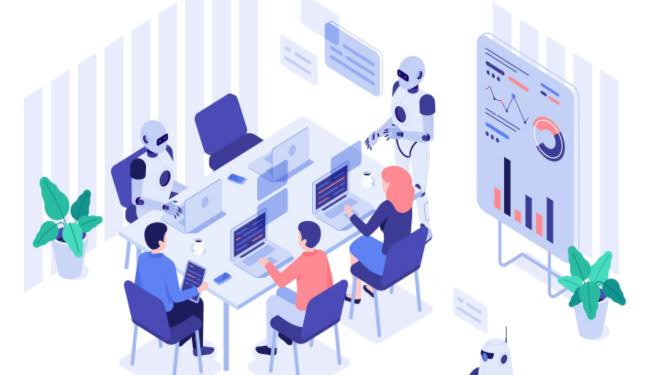Technology continues to transform the way we work and shape the modern workplace. Marketplaces for artificial intelligence (AI) talent are a relatively new idea that are becoming more and more popular as a result of the rising demand for AI-related abilities in the labor market. They serve as a bridge between companies and AI experts, giving companies a place to look for the best personnel for automation-related jobs. These markets provide a range of services, from pairing firms with qualified AI experts to giving those experts training and resources. AI talent marketplaces operate in a multi-step process. On the site, businesses advertise their AI-related initiatives, describing the knowledge and experience needed for the project. AI experts establish profiles on the platform that highlight their qualifications, work history, and portfolios of completed projects
The marketplace for AI talent then matches organizations with qualified AI specialists based on the project needs and the qualifications of the AI specialists. Once a match is made, the AI talent marketplace helps the human resource and the AI expert communicate, and the project is then completed. Just as a market is a place where prospective buyers and sellers are gathered to make exchange of goods and services, AI talent marketplace is an online forum where distinct organizations or companies connect with skilled AI professionals for the specific service they have to render. In this article we’re going to discuss how traditional model disrupt AI talent Marketplace, benefits and downsides of Ai talent Marketplace
How are traditional employment models being disrupted by AI talent marketplaces?
Because AI talent marketplaces give companies more flexibility and agility in their hiring processes, they are fundamentally altering the way traditional employment models function. Instead of relying on full-time employees, businesses can hire independent contractors or freelance labor, which gives them the flexibility to easily scale up or down their workforce to meet changing demands.
The AI talent itself gains from this change toward a more adaptable workforce since they are able to work on a wider range of projects and with different organizations, earning useful experience and exposure to a variety of industries. Marketplaces for AI talent are thereby altering how firms approach hiring new employees and the nature of labor itself
Furthermore,it enable firms access to a wider range of specific required skills and information than they could find in their local job market, giving them a competitive advantage in today’s fast-paced and constantly changing business climate.
The promotion of talent selection based on merit is another way that AI talent marketplaces are changing conventional employment structures. Instead of depending on conventional credentials like degrees or work experience, these markets make use of sophisticated algorithms and other AI tools to assess people based on their skills, performance history, and other relevant factors.
By doing so, it may be possible to reduce bias and other forms of discrimination throughout the hiring process and make sure that the best candidates are chosen based on their skills and potential rather than their background or other unimportant considerations.
Additionally, these markets are helping to close the skills gap, which exists in many industries today and is the discrepancy between the abilities that employers require and the skills that job hopefuls have. By providing access to training and development resources, these marketplaces help people upskill and reskill themselves, keeping them competitive and employable in a job market that is constantly evolving. By ensuring that businesses have access to the personnel they need to innovate, grow, and prosper, this may lead to a rise in economic growth and prosperity.
Benefits of AI talent Market place
The emergence of AI talent marketplace give organizations a wider range of scout globally to hiring AI professionals for their various services. The following are the advantages of AI talent Marketplace.
2.Cost-effective: It may be less expensive to hire freelancing AI experts than to hire full-time workers through talent marketplaces.Without having to pay the overhead costs related to full-time staff, businesses merely pay for the specific project or task that is needed.
3.Flexibility: With the flexibility that AI talent marketplaces offer in terms of project duration, businesses may recruit experts for one-off projects or focused tasks without having to sign long-term employment contracts.
4.Diverse perspectives: As individuals from various backgrounds and nations can work together on projects, AI talent marketplaces give access to a wide variety of perspectives and experience.
Downsides of AI talent Marketplace
The rise of AI talent marketplace present unique challenges for regulators as the platform operates across national borders. The following are the challenges faced by AI talent Marketplace, they include;
1.Quality control: When working remotely, it can be difficult to guarantee the caliber of the work produced by independent AI professionals using talent marketplaces.This may cause problems with the final product’s quality.
2.Lack of commitment: Because they may have other clients and projects to work on concurrently, freelance AI specialists hired through talent marketplaces might not be as dedicated to the company as full-time staff.
3.Security risks: As sensitive information might be exchanged with people outside of the organization’s network, hiring freelancing AI experts through talent marketplaces might also present security problems.
4. Communication barriers: Communication difficulties that arise from working with independent AI experts from other nations and cultures can have an impact on the standard of the work and the final result of the project.
In conclusion, the rise of AI talent marketplaces is changing the world of work in significant ways. While traditional employment models are unlikely to disappear entirely, they will continue to be disrupted by the growth of AI talent marketplaces and the increasing use of AI in recruitment and talent management. The future of work will be shaped by many factors, including the ongoing evolution of AI technologies, changing attitudes toward work and employment, and the regulatory frameworks that are put in place to govern these platforms.


